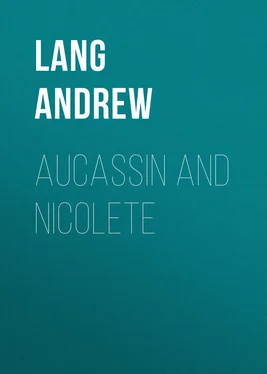Andrew Lang - Aucassin and Nicolete
Здесь есть возможность читать онлайн «Andrew Lang - Aucassin and Nicolete» — ознакомительный отрывок электронной книги совершенно бесплатно, а после прочтения отрывка купить полную версию. В некоторых случаях можно слушать аудио, скачать через торрент в формате fb2 и присутствует краткое содержание. Жанр: foreign_antique, foreign_prose, на английском языке. Описание произведения, (предисловие) а так же отзывы посетителей доступны на портале библиотеки ЛибКат.
- Название:Aucassin and Nicolete
- Автор:
- Жанр:
- Год:неизвестен
- ISBN:нет данных
- Рейтинг книги:3 / 5. Голосов: 1
-
Избранное:Добавить в избранное
- Отзывы:
-
Ваша оценка:
- 60
- 1
- 2
- 3
- 4
- 5
Aucassin and Nicolete: краткое содержание, описание и аннотация
Предлагаем к чтению аннотацию, описание, краткое содержание или предисловие (зависит от того, что написал сам автор книги «Aucassin and Nicolete»). Если вы не нашли необходимую информацию о книге — напишите в комментариях, мы постараемся отыскать её.
Aucassin and Nicolete — читать онлайн ознакомительный отрывок
Ниже представлен текст книги, разбитый по страницам. Система сохранения места последней прочитанной страницы, позволяет с удобством читать онлайн бесплатно книгу «Aucassin and Nicolete», без необходимости каждый раз заново искать на чём Вы остановились. Поставьте закладку, и сможете в любой момент перейти на страницу, на которой закончили чтение.
Интервал:
Закладка:
ανδρι παρ ακληρω
It is an unexpected touch of pity for the people, and for other than love-sorrows, in a poem intended for the great and courtly people of chivalry.
At last the lovers meet, in the lodge of flowers beneath the stars. Here the story should end, though one could ill spare the pretty lecture the girl reads her lover as they ride at adventure, and the picture of Nicolete, with her brown stain, and jogleor’s attire, and her viol, playing before Aucassin in his own castle of Biaucaire. The burlesque interlude of the country of Torelore is like a page out of Rabelais, stitched into the cante-fable by mistake. At such lands as Torelore Pantagruel and Panurge touched many a time in their vague voyaging. Nobody, perhaps, can care very much about Nicolete’s adventures in Carthage, and her recognition by her Paynim kindred. If the old captive had been a prisoner among the Saracens, he was too indolent or incurious to make use of his knowledge. He hurries on to his journey’s end;
“Journeys end in lovers meeting.”
So he finishes the tale. What lives in it, what makes it live, is the touch of poetry, of tender heart, of humorous resignation. The old captive says the story will gladden sad men: -
“Nus hom n’est si esbahis,
tant dolans ni entrepris,
de grant mal amaladis,
se il l’oit, ne soit garis,
et de joie resbaudis,
tant par est douce.”
This service it did for M. Bida, the painter, as he tells us when he translated Aucassin in 1870. In dark and darkening days, patriai tempore iniquo , we too have turned to Aucassin et Nicolete . 5 5 I have not thought it necessary to discuss the conjectures, – they are no more, – about the Greek or Arabic origin of the cante-fable, about the derivation of Aucassin’s name, the supposed copying of Floire et Blancheflor , the longitude and latitude of the land of Torelore, and so forth. In truth “we are in Love’s land to-day,” where the ships sail without wind or compass, like the barques of the Phaeacians. Brunner and Suchier add nothing positive to our knowledge, and M. Gaston Paris pretends to cast but little light on questions which it is too curious to consider at all. In revising the translation I have used with profit the versions of M. Bida, of Mr. Bourdillon, the glossary of Suchier, and Mr. Bourdillon’s glossary. As for the style I have attempted, if not Old English, at least English which is elderly, with a memory of Malory.
BALLADE OF AUCASSIN
Where smooth the Southern waters run
Through rustling leagues of poplars gray,
Beneath a veiled soft Southern sun,
We wandered out of Yesterday;
Went Maying in that ancient May
Whose fallen flowers are fragrant yet,
And lingered by the fountain spray
With Aucassin and Nicolete.
The grassgrown paths are trod of none
Where through the woods they went astray;
The spider’s traceries are spun
Across the darkling forest way;
There come no Knights that ride to slay,
No Pilgrims through the grasses wet,
No shepherd lads that sang their say
With Aucassin and Nicolete.
’Twas here by Nicolete begun
Her lodge of boughs and blossoms gay;
’Scaped from the cell of marble dun
’Twas here the lover found the Fay;
O lovers fond, O foolish play!
How hard we find it to forget,
Who fain would dwell with them as they,
With Aucassin and Nicolete.
ENVOY.
Prince, ’tis a melancholy lay!
For Youth, for Life we both regret:
How fair they seem; how far away,
With Aucassin and Nicolete.
A. L.
BALLADE OF NICOLETE
All bathed in pearl and amber light
She rose to fling the lattice wide,
And leaned into the fragrant night,
Where brown birds sang of summertide;
(’Twas Love’s own voice that called and cried)
“Ah, Sweet!” she said, “I’ll seek thee yet,
Though thorniest pathways should betide
The fair white feet of Nicolete.”
They slept, who would have stayed her flight;
(Full fain were they the maid had died!)
She dropped adown her prison’s height
On strands of linen featly tied.
And so she passed the garden-side
With loose-leaved roses sweetly set,
And dainty daisies, dark beside
The fair white feet of Nicolete!
Her lover lay in evil plight
(So many lovers yet abide!)
I would my tongue could praise aright
Her name, that should be glorified.
Those lovers now, whom foes divide
A little weep, – and soon forget.
How far from these faint lovers glide
The fair white feet of Nicolete.
ENVOY.
My Princess, doff thy frozen pride,
Nor scorn to pay Love’s golden debt,
Through his dim woodland take for guide
The fair white feet of Nicolete.
GRAHAM R. TOMSON
THE SONG-STORY OF AUCASSIN AND NICOLETE
’Tis of Aucassin and Nicolete.
Who would list to the good lay
Gladness of the captive grey?
’Tis how two young lovers met,
Aucassin and Nicolete,
Of the pains the lover bore
And the sorrows he outwore,
For the goodness and the grace,
Of his love, so fair of face.
Sweet the song, the story sweet,
There is no man hearkens it,
No man living ’neath the sun,
So outwearied, so foredone,
Sick and woful, worn and sad,
But is healèd, but is glad
’Tis so sweet.
So say they, speak they, tell they the Tale:
How the Count Bougars de Valence made war on Count Garin de Biaucaire, war so great, and so marvellous, and so mortal that never a day dawned but alway he was there, by the gates and walls, and barriers of the town with a hundred knights, and ten thousand men at arms, horsemen and footmen: so burned he the Count’s land, and spoiled his country, and slew his men. Now the Count Garin de Biaucaire was old and frail, and his good days were gone over. No heir had he, neither son nor daughter, save one young man only; such an one as I shall tell you. Aucassin was the name of the damoiseau: fair was he, goodly, and great, and featly fashioned of his body, and limbs. His hair was yellow, in little curls, his eyes blue and laughing, his face beautiful and shapely, his nose high and well set, and so richly seen was he in all things good, that in him was none evil at all. But so suddenly overtaken was he of Love, who is a great master, that he would not, of his will, be dubbed knight, nor take arms, nor follow tourneys, nor do whatsoever him beseemed. Therefore his father and mother said to him;
Читать дальшеИнтервал:
Закладка:
Похожие книги на «Aucassin and Nicolete»
Представляем Вашему вниманию похожие книги на «Aucassin and Nicolete» списком для выбора. Мы отобрали схожую по названию и смыслу литературу в надежде предоставить читателям больше вариантов отыскать новые, интересные, ещё непрочитанные произведения.
Обсуждение, отзывы о книге «Aucassin and Nicolete» и просто собственные мнения читателей. Оставьте ваши комментарии, напишите, что Вы думаете о произведении, его смысле или главных героях. Укажите что конкретно понравилось, а что нет, и почему Вы так считаете.












